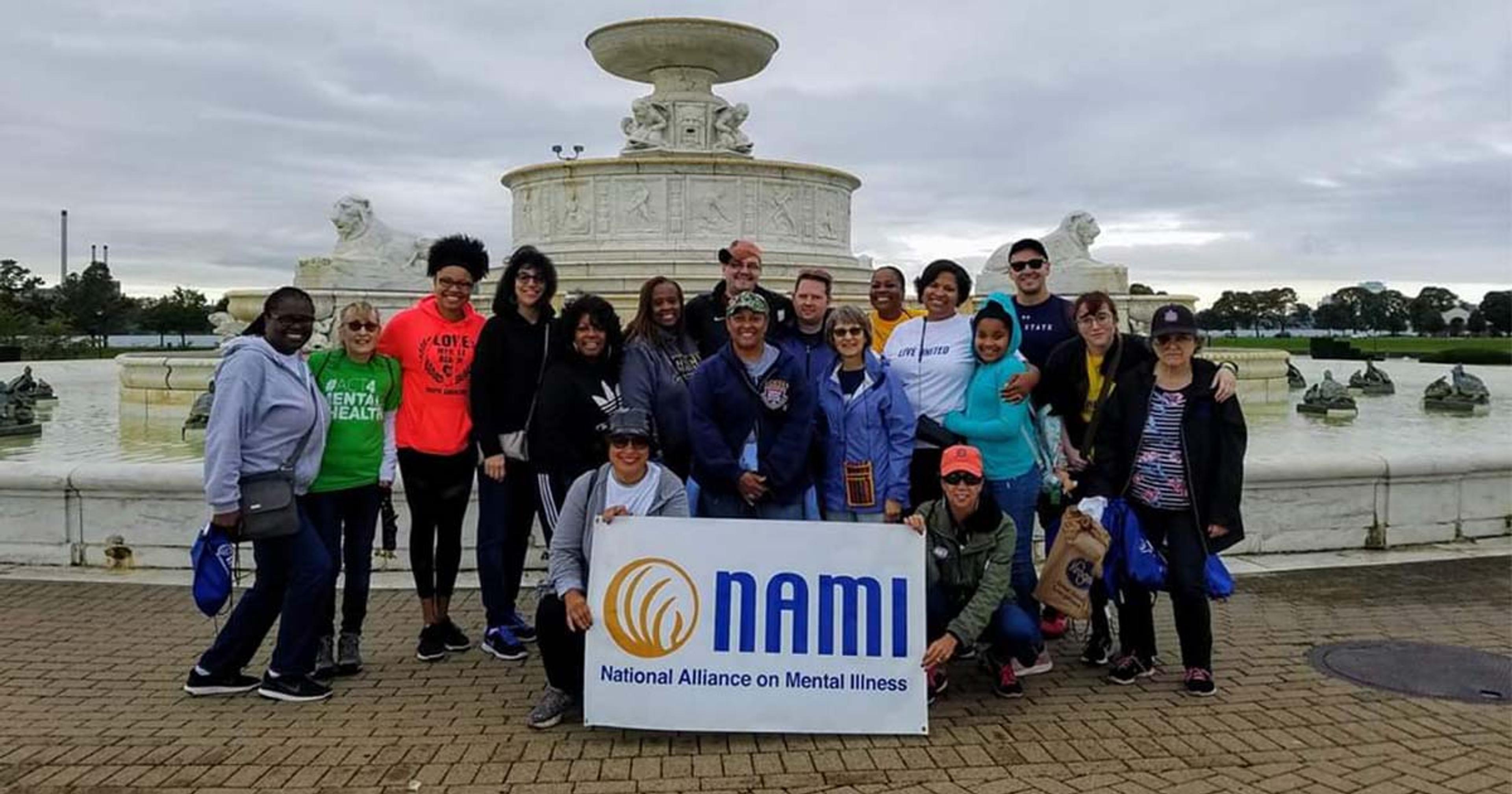Kevin Fischer Lost His Son to Suicide. Now He’s Dedicated to Helping Families Avoid the Same Trauma
Jake Newby
| 7 min read

When Kevin Fischer experienced the unfathomable in 2010 and lost his 21-year-old son to suicide, the Plymouth resident developed suicidal thoughts of his own.
“I didn’t handle the grief and depression very well,” said Fischer, during an interview with Blue Cross Blue Shield of Michigan. Fischer now serves as executive director of the National Alliance on Mental Illness’ (NAMI) Michigan chapter. “I had planned my own suicide. Thank God, clearly, I didn’t go through with it. But my current wife introduced me to NAMI. I didn’t know anything about it. She didn’t know I was experiencing suicidal ideology she just knew I was dealing with grief and depression.”
For the past 12 years since losing his son, Dominique, Fischer has dedicated his life to mental health and suicide prevention advocacy. On top of his role at NAMI, Fischer serves on the Board of Directors of several behavioral health organizations throughout the state.
Fischer said his son’s mental health issues became apparent during Thanksgiving break one year, when Dominique – a sophomore at John Carroll University at the time – came home to visit the family.
“He was just rambling about God working for him. He talked about taking over the world for the better,” Fischer recalled. “It was something me and his mother had never seen before.”
Thinking he had been experimenting with drugs while away at school, Fischer and his ex-wife took Dominique to a hospital to have him screened.
“That’s when we received a surprising diagnosis. His doctor said, ‘There’s no drugs or alcohol in his system but we’re going to put him on a 72-hour psyche hold.’ His initial diagnosis was schizophrenia.
Shortly after they added the diagnosis of bi-polar disorder.” Fischer admitted to being “very ignorant” at that time to mental illness and treatment for it.
“From late 2007 literally until the day he passed, we kind of floundered trying to understand treatment, continuity and care, medication, all that stuff,” Fischer admitted.
Fischer became associated with NAMI initially to manage the grief he felt from losing his son. He was trying to gain an element of closure.
“As men, as fathers, we’re programmed to be protectors and providers and I felt that I failed my son,” he said. “I felt that I failed his mom, I felt that I failed God. I was trying to understand what I missed. And what this has become was really unintentional. One thing just kind of led to another. I started absorbing more and more information.”
Breaking down the stigma barrier
When Fischer quit his job as a driver for a large grocery chain in 2009 to care for Dominique full time, he started seeing improvements in his son’s condition.
But he noticed that once Dominique’s friends and family became increasingly aware of Dominique’s condition, he became self-conscious, stopped taking his medication, and eventually started self-medicating. Fischer believed Dominique regressed, in part, because of the stigma surrounding his mental health.
Fischer’s core messaging as an advocate revolves around breaking down that stigma, which he considers to be a barrier to early diagnosis and treatment. “The earlier we diagnose and provide treatments, the better the outcome,” Fischer stressed.
“The fact is most people with proper diagnoses and treatment can go on to live normal, productive lives.”
He said the best thing people can do to chip away at that barrier is to talk about mental health.
“We have to normalize the conversation, so people don’t fall into the trap of the stigma,” he said. “Mental health is unfortunately thought of as a weakness of character. Some people even think people choose mental illness. But it’s a medical diagnosis. It’s primarily a chemical imbalance in the brain and we need to recognize that. We don’t blame people who are diagnosed with cancer or with diabetes. We should not blame people who are diagnosed with serious or even mild-to-moderate forms of mental illness.”
Dominique was entering early adulthood when his symptoms started to develop. Fischer said when it comes to the mental health of teens and young adults specifically, parents should keep their ears and their minds open. In his experience, teens often try to discuss their mental health issues with their parents, who aren’t always receptive.
“My recommendation to parents is to listen to your kids,” Fischer said. “If your child has enough courage to come to you and say, ‘Mom or dad, I’m not feeling quite myself,’ you should taket hem seriously and have that conversation.”
Warning signs of mental health issues in teens
Fischer mentioned a handful of warning signs parents should watch for if they suspect their teen might be experiencing a mental health issue.
“They withdraw from friends,” he said. “They’re not engaging in experiences that once brought them joy, whether it’s sports, music dance.” “If they have a huge swing in behavior or huge change in friends,” Fischer added. “Because sometimes you’ll see a very popular or very outgoing student become withdrawn. Or they start hanging out with people engaging in more risky behavior, maybe it’s drugs or alcohol. They’re getting driving tickets, those kinds of things.”
Suicide prevention awareness
Don’t let the mental health issue of a loved one fester and reach its apex. As a suicide prevention advocate, Fischer has stressed this message relentlessly over the years.
“Don’t wait until a crisis happens. That’s a fail-first model,” he said. “We don’t want to allow a person to get to a point where we’re concerned that they are a threat to themselves or others. We need to intervene early, at the very first sign that you think something is wrong, that’s when you have a conversation.”
According to NAMI, only 46% of people who die by suicide had a diagnosed mental health condition. Fischer expanded on this statistic by saying that many people who die by suicide experience an emotional pain, traumatic event, or short-term issue, and just need to be heard.
“Many people are experiencing issues that they feel like they’re going through alone,” he said. “If you know someone who might be in that situation, just talk to them.”
Speaking from experience, Fischer added that genuineness is important. “Genuinely listen. We have a tendency to listen and respond – most of us just need to be heard,” he said.
“Once I was able to talk about how I was feeling and my grief, I didn’t feel suicidal anymore.”
He hates the way he got here, but Fischer said he relishes the platform he has to help people, improve the quality of their lives and potentially even save some lives. He added that there are resources for parents and places to call if issues like these arise and they become overwhelmed.
Here are some of those resources:
The NAMI Helpline can be reached Monday through Friday from 10 a.m. until 10 p.m. EST. Call 1-800-950-NAMI (6264), text "HelpLine" to 62640 or send an email to helpline@nami.org.
Suicide and Crisis Lifeline: Call the 988 lifeline or 1-800-273-8255 for support 24 hours a day, seven days a week.
Blue Cross Blue Shield of Michigan and Blue Care Network can help members find an in-network mental health professional by calling behavioral health access lines listed below:
PPO: Behavioral Health Access Line | 1-800-762-2382
- A free and confidential resource that’s just a call away when you need immediate support. Behavioral health professionals answer, 24/7.
HMO: Behavioral Health Access Line | 1-800-482-5982
- Connect with a behavioral health clinician if you need help finding a mental health or substance use provider.
- Behavioral health clinicians are available for routine assistance from 8 a.m. to 5 p.m., Monday through Friday. For urgent concerns after hours, clinicians are also available 24 hours a day, seven days a week.
Photo credit: Kevin Fischer/NAMI
More from MIBluesPerspectives:





